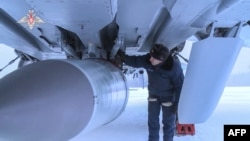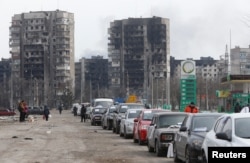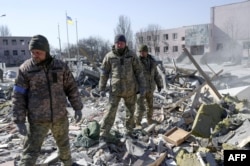Russian military officials said Saturday that they fired hypersonic missiles for the first time in Ukraine to target what they said was an underground weapons storage site in the west of the country.
Kinzhal missiles travel so fast, at Mach 9, they are meant to be able to evade detection by defense systems, and when announcing the missiles’ development in 2019, Russian President Vladimir Putin described them as “invincible.”
“The Kinzhal aviation missile system with hypersonic aero-ballistic missiles destroyed a large underground warehouse containing missiles and aviation ammunition in the village of Deliatyn in the Ivano-Frankivsk region,” the Russian Defense Ministry said Saturday. The strike was on Friday, but the Russian claim has not been independently verified.
Ukrainian military officials say the use of the Kinzhal missiles further highlights how Russia has failed to meet strategic battlefield goals with conventional ground forces and is intensifying both indiscriminate bombing of civilian infrastructure and the use of high-precision strikes to try to terrorize Ukraine and break its will to resist.
The General Staff of Ukraine’s Armed Forces said Saturday Russia had conducted 14 missile strikes and 40 air raids on targets, mainly civilian ones, across Ukraine in the past 24 hours.
They have also acknowledged Russian claims that its soldiers have entered the center of the besieged port city of Mariupol in southern Ukraine, which has been shelled and starved for days in a siege that has left the town of 300,000 with little food or water and without electricity and internet. Bodies have been left in the streets or covered up on balconies. Ukrainian President Volodymyr Zelenskyy said Saturday the city was experiencing “the greatest ordeal in its history, in the history of Ukraine.”
Mariupol’s mayor, Vadym Boichenko, appeared to confirm Russian claims of a penetration deep into the town, saying skirmishes were raging near where he was sheltered.
With Mariupol apparently on the brink of falling, the General Staff has acknowledged that it has lost access to the Sea of Azov “temporarily” because Russian forces have managed to tighten their grip around Mariupol.
But while Russian forces make some progress in the south of the country, if haltingly, they remain stalled in the north of the country and may have given up for now trying to press into Kyiv.
Satellite imagery released by Maxar Technologies, a space technology and earth-observation company, appears to show the Russians building protective dirt berms near the villages of Ozera, of Zdvyzhivka and Berestyanka, northwest of Kyiv, and around Antonov Air Base. The berms may be there to guard against Ukrainian counterattacks, Western officials say, after a series of successful ones, conducted mainly at night, in recent days that pushed back Russian units northwest and east of Kyiv.
However, the berms might also indicate the Russians are digging in, they say.
Going into the fourth week of Russia’s war on Ukraine, and Russian forces have not managed to overrun the major cities of Kyiv and Kharkiv, in northeast Ukraine, nor neighboring Sumy, and they have not been able to target the Black Sea port of Odesa yet because of Mariupol’s defiance, and as a result of stiff resistance in Mykolayiv, where Russian Gen. Andrey Mordvichev, was killed this week, according to Ukrainian authorities, the fifth Russian general to have died in the fighting in Ukraine.
“Thanks to the courage and training of the Ukrainian armed forces, the occupying troops were stopped in almost all directions. Difficult battles in Kharkiv region — especially heavy battles near Izium,” Zelenskyy said in a video address Saturday. “Kyiv region, Sumy region, Chernihiv region, in the south of our state — the army stopped the invaders. The initial plan of the Russian military to seize our state failed. And it is felt that they do not know what can be done with us. It seems that their military commanders are not able to offer their political leadership anything but cruel and misguided tactics to deplete us, deplete Ukraine,” Zelenskyy said.
Institute of the Study of War, a Washington-based think tank monitoring the shifting battlefield, believes that aside from territorial gains around Mariupol, Russian forces have made no major ground gains and that the invading units are likely being engulfed by morale and supply problems.
But Western defense officials and independent military strategists are raising concerns about one battlefield maneuver the Russians might try, warning Russian forces may seek to engineer a pincer movement targeting the city Dnipro on the Dnipro River by dispatching forces southwest from Kharkiv and northeast from Kryvyi Rih. If they could manage to pull off such a maneuver, it would entrap a large portion of Ukrainian ground forces currently containing Russian forces in Donetsk and Luhansk, they say.






